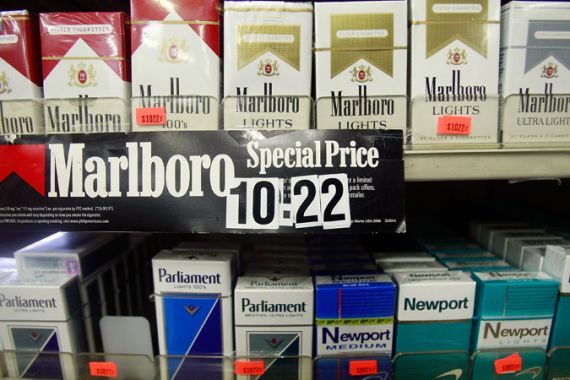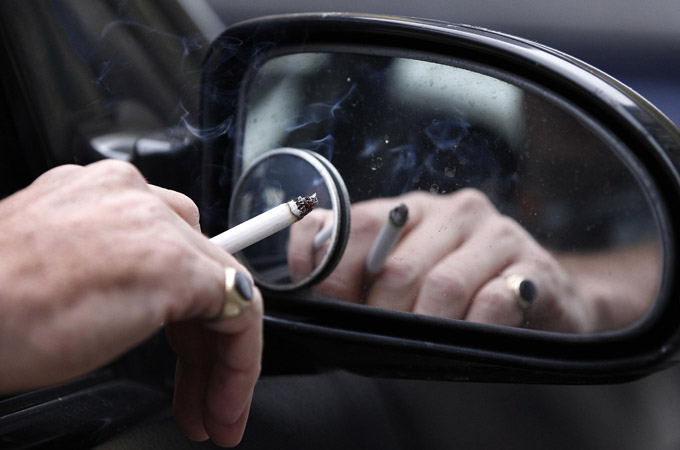Tobacco giant sues Australia over package law
Philip Morris launches legal action over move that would see cigarettes and other products sold in logo-free packaging.

 |
| Some Australian states ban smoking in cars if a child is a passenger [Reuters] |
Philip Morris, one of the world’s largest tobacco companies, has announced that it is suing the Australian government over a new law requiring all cigarettes to be sold in plain packages.
“We are left with no option,” Anne Edwards, a Philip Morris Asia spokesperson, said in a statement on Monday.
|
“Plain packaging means that the glamour is gone from smoking and cigarettes are now exposed for what they are: killer products that destroy thousands of Australian families.” – Nicola Roxon, health minister |
“The government has passed this legislation despite being unable to demonstrate that it will be effective at reducing smoking and has ignored the widespread concerns raised in Australia and internationally regarding the serious legal issues associated with plain packaging.”
Australia’s parliament recently passed laws compelling cigarettes, pipe tobacco and cigars to be sold in plain olive packs from December 2012.
The move, Philip Morris argues, will have a negative impact on the sales of its internationally recognised cigarette brands – including Marlboro, Parliament, Bond Street, Merit and Virginia Slims.
Philip Morris Asia Ltd, Hong Kong, the owner of the Australian affiliate, has issued a legal challenge to the law through a notice of arbitration under Australia’s Bilateral Investment Treaty with Hong Kong.
The proceedings are being closely watched by governments considering similar moves in Europe, Canada and New Zealand, angering tobacco companies worried that they may set a global precedent and infringe on trademark rights.
Tobacco export countries including Nicaragua, Dominican Republic and Ukraine have warned that they may challenge the action under world trade rules; while tobacco companies, including British American Tobacco and Imperial Tobacco, have said they may challenge the law in Australia’s high court.
In a similar move, four of the five largest US tobacco firms filed a lawsuit earlier this year against the US Food and Drug Administration over graphic label requirements they claim are “unconstitutional”.
Legal experts have predicted both legal and world trade challenges to fail, as intellectual property rights agreements give governments the right to pass laws to protect public health.
‘Killer products’
Nicola Roxon, Australia’s health minister, speaking after parliament’s lower house approved laws already passed by the senate last week, demanded tobacco companies respect the will of the parliament.
“Plain packaging means that the glamour is gone from smoking and cigarettes are now exposed for what they are: killer products that destroy thousands of Australian families,” Roxon told reporters.
| IN Video |
|
Australia bans logos on cigarette packs, June 2011 |
Roxon said that while the tobacco industry was fighting to protect its profits, the government was “fighting to protect lives”.
The World Health Organisation in 2005 urged countries to consider plain packaging, and estimated more than one billion are regular smokers, 80 per cent of them in poor countries.
Industry analysts say tobacco companies are worried that plain packaging could spread to important emerging markets like Brazil, Russia and Indonesia, and threaten growth there.
Conservative opposition MPs, while backing the laws, urged Roxon to accept a three-month moratorium on prosecutions and the enforcement of heavy fines for small tobacco sellers to give them time to adjust to the possible impact on sales.
Australia already bans tobacco advertising, smoking in public buildings and the public display of cigarettes in shops.
In some states, it is illegal to smoke in a car if a child is a passenger.
Australia wants to cut the number of people who smoke from around 15 per cent of the population to 10 per cent by 2018.
Health authorities say smoking kills 15,000 Australians each year with social and health costs of around $32bn.